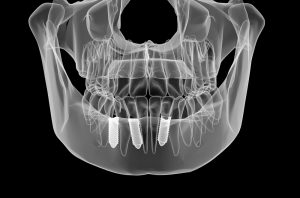 Before undergoing a dental procedure, most patients need x-rays taken. Dr. Claudia Denes in Fresno, CA uses CT scanners to make diagnoses and create precise treatment plans. At Fresno Dental Studio, we use cone beam CT scans to capture high-quality images in a single scan, rather than taking individual multiple images. Dr. Denes has found that from CBCT scans, she is able to make more accurate diagnoses and provide better treatment plans for her patients.
Before undergoing a dental procedure, most patients need x-rays taken. Dr. Claudia Denes in Fresno, CA uses CT scanners to make diagnoses and create precise treatment plans. At Fresno Dental Studio, we use cone beam CT scans to capture high-quality images in a single scan, rather than taking individual multiple images. Dr. Denes has found that from CBCT scans, she is able to make more accurate diagnoses and provide better treatment plans for her patients.
How Does a CBCT Scan Work?
Cone beam computed tomography (CBCT) scans capture a precise image of dental structures, such as soft tissues, teeth, bone, and nerve paths. From this single image, Dr. Denes diagnoses TMJ disorder, identifies appropriate placement for dental implants, and creates an accurate surgical plan for extracting impacted teeth.
A CBCT scanner rotates around the patient’s head, taking multiple images in the process. Together, these images make up a single, 3D image.
Although some patients express concern over the higher radiation levels used in this specialized x-ray machine, the levels in this single scan are far less than the amount contracted during traditional x-rays.
Along with accuracy, CBCT scans provide quick results so that Dr. Denes can begin creating a treatment plan and schedule the upcoming procedure immediately. Patients have found that a dentist with a CT scan provides overall faster results than a dentist who uses digital x-ray machines, or even old-school x-ray technology.
What Can a CBCT Scan Do?
Dr. Denes uses the CBCT scan to diagnose a variety of dental issues. From this 3D image, she can detect the ideal location for dental implants. From there, she surgically inserts the titanium posts in the jawbone, creating a strong, secure base for restorative treatment, such as crowns, bridges, and dentures.
CBCT scans assist in diagnosing and treating TMJ disorder. There is a temporomandibular joint on each side of your jaw, which attaches your lower jaw directly to your skull. When excessive pressure is placed on the jaw joints, patients can experience jaw pain, upper body stiffness, frequent migraines and headaches, and extreme discomfort when opening their mouth. With this technology, Dr. Denes can detect misaligned jaw and will recommend the appropriate treatment.
Patients with severely damaged teeth, TMJ disorder, or missing teeth may want to completely reconstruct their mouth. Full mouth reconstruction improves appearance, oral health, and function. Dr. Denes uses CT scans to identify which procedures a patient will most benefit from. The image produced from a CBCT scan helps her plan your reconstructive procedures and surgeries.
Most patients undergo wisdom teeth extractions during their teenage or young adult years. Rather than using a digital x-ray to depict wisdom teeth location, Dr. Denes has found that a CBCT scan produces more accurate imaging; therefore providing her the exact location of the impacted teeth and nearby nerve pathways. This helps her extract the teeth with minimal complications, providing the patient with quicker recovery times and less discomfort.
Dr. Denes incorporates advanced technology so that she can provide her patients with better care. Our office uses electronic records, advanced scans, and digital x-rays for faster, more accurate and effective treatment for our patients.